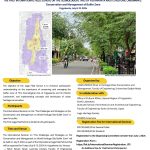INTERNATIONAL MASTERCLASS
“INTRODUCTION TO MAIN STREET”
18-21 September 2023
Pancabrata Prof. Herman Yohannes Building, Engineering Research & Innovation Center(ERIC), Faculty of Engineering, Universitas Gadjah Mada, Yogyakarta, Indonesia
Organized by Heritage Strategies International (HSI), Washington DC, USA
The Indonesian Heritage Trust (Bumi Pelestarian Pusaka Indonesia/BPPI), Jakarta
Research Group for Heritage Cities Conservation and Management (HCCM), CoE Sustainable Environment, ERIC, Faculty of Engineering, Universitas Gadjah Mada, Yogyakarta
In collaboration with Ikatan Peneliti Lingkungan Binaan Indonesia (IPLBI)
Rationalization
The United States of America has been implementing “Main Street” for 40 years it is the systematic approach to using a city’s heritage buildings as the basis for commercial district revitalization. Originally started as a National Trust for Historic Preservation program as a downtown revitalization program for smaller towns, it has been effectively used in neighborhood commercial
districts in large cities. Main Street has become by far the most cost-effective form of economic development of any kind in the US. More than 2000 towns and cities of every size have utilized the Main Street Approach tobring economic life back totheir commercial districts, including Boston, Philadelphia, Baltimore, Chicago, Washington and
others. In England this approach is known as “High Street”, Latin America as “Calle Principal”, in India it is sometimes called “Commercial Street”. While in the Netherlands, the synonym for Main Street is Hoofdstraat.
A Main Street revitalization effort is organized through what are known as the Four Points Approach:
Organization, Promotions, Design, and Economic Vitality.
- Organization is the base upon which all the other aspects are built. Main Street entities are usually organized as a non-profit (NGO) organization, run by a volunteer Board of Directors. The Board hires and oversees a Program Manager who is responsible for day-to-day operations. The real work of Main Street, however, is done through volunteer members of committees structured around the Four Points – a Promotions Committee, a Design Committee, andan Economic Vitality Committee. The role of the Organization Committee is often performed by the Board of Directors. Responsibilities of the organization Committee include raising funds for the organization, recruiting volunteers, establishing an annual workplan, and representing the Main Street organization in front of City Hall and the general public.
2. Promotions Committee has the responsibility of selling a positive image of the district based on authentic, creative assets of the community as well as being the marketing arm of the Main Street organization. Organizing events are the focus of most Promotions Committees, and include image promotions for the commercial district, coordinating retail promotions for the businesses, andspecial events. Three or four special events eachyear might include organizing the Independence Day parade and fireworks display, an annual ethnic festival, special holiday events, andcommunity heritage celebrations. When done right, each of the events not only draws people to the commercial district but reinforces the character anddifferentiation of the district.
3. Design is the element of the Four Point Approach that is most closely related to heritage conservation. The Design Committee members assist property owners with making appropriate decisions regarding their historic buildings, often by providing professional design assistance. Additionally, the Design Committee may be proponents of improvements to public spaces, advising the City on issues including sidewalks, parking, parks, lighting, street redesign, and other public infrastructure projects. Many Main Street programs administer grant andlow interest loan programs, particularly for façade improvements. The Design Committee often serves as a designreview panel to approve work to be done with those funds.
4. Economic Vitality Committee is the “economic development” component of Main Street. That committee’s responsibilities might include business retention and recruitment efforts, identifying new market opportu- nities for new and expanded businesses, arranging incentives for development, and conducting customer surveys.
The secret to Main Street’s success is because it is comprehensive. Fixing up older buildings is certainly necessary but not sufficient for revitalization – it requires the other elements of the Main Street Approach as well. Main Street is also incremental – it is not a quick fix or an instant answer. Main Street builds on existing assets and works through partnerships with the local government, with business and property owners, and with other organizations. Main Street is not about theory, it is about implementation , building on the existing strengths and the character of the community.
The outstanding results of Main Street are reflected in more than 2000 cities in the United States with their struc- turedtraining programs. Washington DC-based Heritage Strategies International/HSI (https://hs-intl.com/) is working together with Main Street America to provide training and assistance to Main Street programs outside the United States. In light of this, HSI invited the Indonesian Heritage Trust (BPPI) and the CoE Sustainable Environment, ERIC, UGM Faculty of Engineering to organize an “Introduction to Main Street” training in Yogyakarta, a city currently in the process of nomination as a UNESCO World Heritage “The Cosmological Axis of Yogyakarta and Its Historic Land- marks”.
Workshop Implementation Plan
– Time : 18-21 September 2023
– Venues :
-
- Pancabrata Prof. Herman Yohannes Building, ERIC, UGM Faculty of Engineering, Yogyakarta
- Ketandan Heritage District(Chinatown)
- Kotagede Heritage District(Omah UGM)
- Heritage Trail through Malioboro Heritage District
Agenda
Day 1
- Introduction to course, participants, logistics, etc.
- An introduction to Main Street – (HSI Team)
– Philosophy, history, Four Point Approach, success stories, lessons learned
- Lecture on World Heritage Site,OUV, history, etc. (Laretna)
- Walking tour of historic commercial area which will be the focus of the workshop.
- Group exercise todefine boundaries of target area for course
- Local lecture on issues/challenges/opportunities in area
Day 2 Morning
- Organization (Swink)
- The importance of partnerships – public/private/non- profit (NGO)
- Who needs to be involved and how to get involvement
- Creating a shared vision
- Developing a strategic plan of work
- Short lecture by local expert on legal frameworkfor a possible organization (~15 minutes) (to be determined)
- Participant assignment
- This will be a 30-minute exercise toengage participants in Main Street thinking specific to Organization
Day 2 Afternoon
- Promotion (Cotton)
- Identifying your assets
- Celebrating place
- Who needs to be involved
- Tools, strategies, andincentives for marketing place
- Short lecture by local expert on existing marketing/branding efforts for heritage area (~15 minutes) (Catrini)
- Participant assignment
- This will be a 30-minute exercise toengage participants in Main Street thinking specific to Promotion
Day 3 Morning
- Design (Swink and Cotton. Local specialistto be determined withsupport of HSI team)
- Introduction to Main Street designprinciples
- The importance of good design in the public realm
- Tools, strategies, andincentives tosupport design
- Discussion of architectural history, styles, significance of the built heritage of host city and district
- Participant assignment
- This will be a 30-minute exercise toengage participants in Main Street thinking specific to Design
Day 3 Afternoon
- Economic Vitality (Rypkema)
- Understanding your market – strengths, weaknesses, competition
- Commercial andresidential opportunities
- Identifying andutilizing empty space
- Tools, strategies, andincentives toenhance the marketplace
- Short lecture by local expert on existing heritage incentives, policies, etc.
- Short lecture by local expert on market conditions – rents, vacancy, property values, etc.
- Participant assignment
- This will be a 30-minute exercise toengage participants in Main Street thinking specific to Economic Vitality
Day 4 Morning
- Participants, working in teams, will prepare strategiesfor implementation of a Main Street program using the neighborhood that has been the focus of the workshop.
Day 4 Afternoon
- Team presentations
- Summary, wrap up, and presentation of Certificates of Completion
Language:
The workshop will take place offline andmainly use English. Interpretation in Indonesian will be provided upon request.
Maximum 50 participants from Indonesia and Asia with backgrounds as follows:
- Regional government officials
- Professionals in heritage conservation, business andeconomics, urbanplanning and design, architecture
- Related academics
- Heritage owners, activists, advocates
- Other interested parties Anticipated outcomes for the workshop:
- Participants (stakeholders/workgroups) will learn the Main Street Four Point Approach and how to use that to revitalize the selected area.
- Participants from Indonesia and Asia will be able to learn from this training how to introduce Main Street in other similar redevelopment settings, especially for
- Management and Conservation for Indonesian Heritage Cities Program, as stated in the Indonesian Charter for Heritage Cities Conservation 2013 which highlights the following 8 instruments:
-
- Institution and Management of Heritage Cities
- Heritage Inventory and Documentation
- Information, Education, and Promotion of the Heritage City
- The Heritage City Economy
- The Heritage City Disaster Risk Management
- Development of Community Cultural Life
- The Heritage City Spatial Planning, Facilities and Infrastructure
- The Heritage City Design Management
- Local participants will have prepared a preliminary plan on how a Main Street approach might be initiated.
Registration:
Include certificate, learning materials, transportation tovenues, lunch. Not including plane tickets to Yogyakarta, accommodation, insurance, food & beverage outside of the workshop, and other personal expenses.
- Early Bird: IDR 5.500.000 for local / USD 550 for international (deadline: 31 July 2023)
- Regular: IDR 6.000.000 for local / USD 600 for international (deadline: 15 August 2023)
- Link for registration: https://bit.ly/RegisterMasterclassMainStreet2023
- (Note: the registration will be closed once the maximum number of participants is reached)
- Contact person: Yeny +62 813-9205-9690; Anti, +62 812-9898-4560
- Selected participants announcement: 20 August 2023



